
Timothy Michael Kaine is an American lawyer and politician serving as the junior United States senator from Virginia since 2013. A member of the Democratic Party, he served as the 70th governor of Virginia from 2006 to 2010, and as the 38th lieutenant governor of Virginia from 2002 to 2006. Kaine was the Democratic nominee for vice president of the United States in the 2016 election as Hillary Clinton's running mate.

Harry Russell Potts Jr. was an American businessman, journalist, and politician who served as a Republican state senator in Virginia, representing the 27th district from 1992 to 2008. An independent candidate for Governor of Virginia in 2005, Potts received 2.22 percent of the vote in a race won by Democrat Tim Kaine, far below the votes received by Republican Jerry Kilgore. Following backlash within the Republican Party from his 2005 independent candidacy, Potts retired from the state senate at the following election.

The 2005 Virginia gubernatorial election was held on November 8, 2005 to elect the Governor of Virginia. The Democratic nominee, Lieutenant Governor Tim Kaine, the son-in-law to Linwood Holton, won the election. Virginia is the only state in the United States to prohibit governors from serving successive terms, meaning that the popular incumbent, Mark Warner, could not run for reelection.
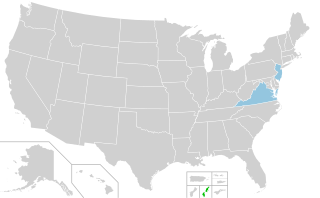
United States gubernatorial elections were held on November 8, 2005, in the states of New Jersey and Virginia as well as in the U.S. commonwealth of the Northern Mariana Islands.
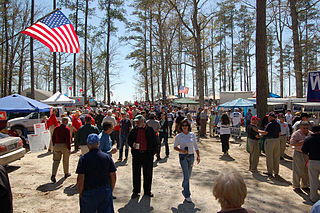
The Shad Planking is an annual political event in Virginia which takes place every April near Wakefield in Sussex County. It is sponsored by a chapter of the Ruritans, a community service organization which was founded in the small town of Holland about 30 miles to the southeast.

The 2006 United States Senate election in Rhode Island was held on November 7, 2006. Incumbent Republican Lincoln Chafee sought re-election to a second full term in office, the seat he had held since 1999 when he was appointed to fill the vacancy created by the death of his father John Chafee. He lost to Democratic nominee, former state Attorney General Sheldon Whitehouse by a 7-point margin. Lincoln Chafee later left the Republican Party in September 2007 before running successfully as an Independent for Governor of Rhode Island in 2010.

The 2005 United States elections were held on Tuesday, November 8. During this off-year election, the only seats up for election in the United States Congress were special elections held throughout the year. None of these congressional seats changed party hands. There were also two gubernatorial races, state legislative elections in two states, numerous citizen initiatives, mayoral races in several major cities, and a variety of local offices on the ballot.

William Troy Bolling is an American businessman, politician and educator who served as the 39th Lieutenant Governor of Virginia.

Aston Donald McEachin was an American politician and lawyer who served as the U.S. representative for Virginia's 4th congressional district from 2017 until his death in 2022. His district was based in the state capital, Richmond; it included much of the area between Richmond, a portion of its suburbs, and Hampton Roads.

Robert Creigh Deeds is an American lawyer and politician serving as a member of the Senate of Virginia representing the 25th district since 2001. Previously, he was the Democratic nominee for Attorney General of Virginia in 2005 and Governor of Virginia in 2009. He was defeated in both of those races by Republican Bob McDonnell. Deeds lost by just 323 votes in 2005, but was defeated by a wide margin of over 17 percentage points in 2009. He was a member of the Virginia House of Delegates from 1992 to 2001.
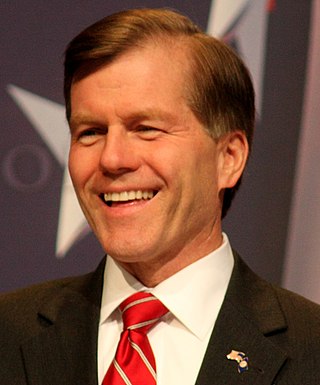
The 2009 Virginia gubernatorial election took place in Virginia on November 3, 2009. The incumbent Governor, Democrat Tim Kaine, was not eligible to run due to term limits established by the Virginia Constitution, though others in the state's executive branch were not restricted. Republican Bob McDonnell was elected as Governor as part of a Republican sweep. Republican Bill Bolling was reelected as lieutenant governor, and Republican Ken Cuccinelli was elected as attorney general. The winners were inaugurated on January 16, 2010, and served until January 11, 2014.
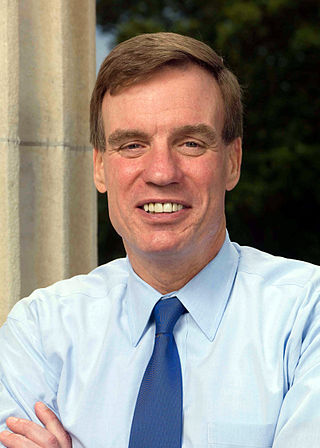
Mark Robert Warner is an American businessman and politician serving as the senior United States senator from Virginia, a seat he has held since 2009. A member of the Democratic Party, Warner served as the 69th governor of Virginia from 2002 to 2006. He is vice chair of the Senate Democratic Caucus and chair of the Senate Intelligence Committee.

The 2008 congressional elections in Virginia were held on November 4, 2008 to determine who would represent the Commonwealth of Virginia in the United States House of Representatives, coinciding with the presidential and senatorial elections. Representatives are elected for two-year terms; those elected served in the 111th Congress from January 3, 2009 until January 3, 2011. Primary elections were held on June 10, 2008.
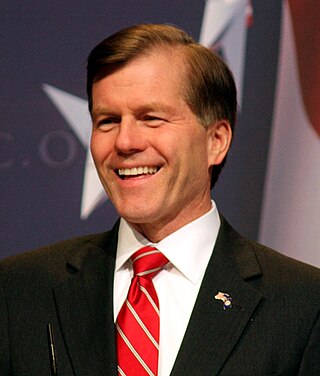
The Virginia Attorney General election of 2005 took place on November 8, 2005, to elect the Attorney General of Virginia. Jerry Kilgore, who had been elected attorney general in 2001, resigned in February 2005 to run for Governor, as is the tradition in Virginia. He was replaced by Judith Jagdmann, the Deputy Attorney General for the Civil Litigation Division, who did not run in the election.

Elections in Virginia are authorized under Article I of the Virginia State Constitution, sections 5–6, and Article V which establishes elections for the state-level officers, cabinet, and legislature. Article VII section 4 establishes the election of county-level officers. Elections are regulated under state statute 24.2-102. The Virginia State Board of Elections oversees the execution of elections under state law. In a 2020 study, Virginia was ranked as the 12th easiest state for citizens to vote in.

The 2012 United States Senate election in Virginia took place on November 6, 2012, concurrently with the 2012 U.S. presidential election as well as other elections to the United States Senate and House of Representatives and various state and local elections. Incumbent Democratic U.S. Senator Jim Webb retired instead of running for reelection to a second term, and former Democratic governor of Virginia Tim Kaine won the open seat over Republican former senator and governor George Allen. Kaine was unopposed for the Democratic nomination, and the Republicans nominated Allen through a primary on June 12, 2012. Allen had previously held this seat for one term before narrowly losing reelection to Webb in 2006.

The 1989 New Jersey gubernatorial election was held on November 7, 1989. Incumbent Republican Governor Thomas Kean was term-limited after two consecutive terms. Democrat James Florio, a U.S. Representative from Camden County and a twice-unsuccessful candidate for Governor, defeated Republican U.S. Representative Jim Courter by the lopsided margin of 61.2%-37.2%.
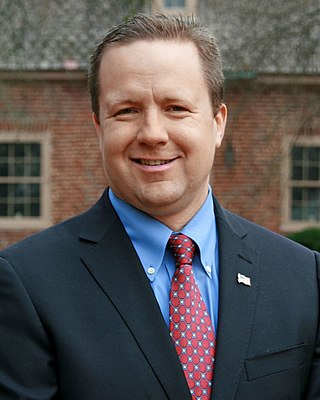
The 2018 United States Senate election in Virginia took place on November 6, 2018, to elect a member of the United States Senate to represent the Commonwealth of Virginia, concurrently with other elections to the U.S. Senate, elections to the United States House of Representatives, and various state and local elections. Incumbent Democratic Senator Tim Kaine, who had been his party's nominee for vice president two years earlier, was re-elected to a second term in office, winning this seat by the largest margin since 1988. This was the first election since 1994 that anyone had been re-elected to this seat.

The 2021 Virginia gubernatorial election was held on November 2, 2021, to elect the next governor of Virginia. The election was concurrent with other elections for Virginia state offices. Incumbent Democratic Governor Ralph Northam was ineligible to run for re-election, as the Constitution of Virginia prohibits governors from serving consecutive terms. Businessman Glenn Youngkin won the Republican nomination at the party's May 8 convention, which was held in 37 polling locations across the state, and was officially declared the nominee on May 10. The Democratic Party held its primary election on June 8, which former Governor Terry McAuliffe easily won.

The 2022 Kansas gubernatorial election took place on November 8, 2022, to elect the governor of Kansas, with primary elections taking place on August 2, 2022. Governor Laura Kelly ran for re-election to a second term, facing Republican State Attorney General Derek Schmidt in the general election.


















